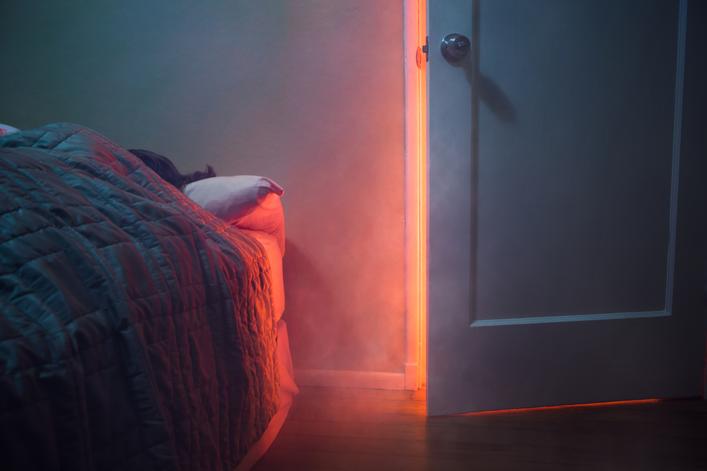Closed doors are critical lifesavers during fires
Richard D. Gerhart Jr. recalls the cat-and-mouse game he’d play with the owner of a large apartment building over the years while he was a fire marshal in Lower Alsace Township.
The owner propped open the fire doors — the self-closing doors residents used to access their floors from the common stairwell — with wooden wedges because some tenants complained they couldn’t see through the doorway to their hallway as they came up the stairs when the fire door was closed
“I would go back and take them all out,” Gerhart said, “and he would make more wedges.”
The owner called the township building a couple of times to complain about the fire marshal’s diligence in enforcing the fire code, but Gerhart wouldn’t back down.
“I was trying to make him understand that during a fire, a closed door is just as good as a smoke detector: It’s going to save your life,” he said.
Gerhart, who currently serves as fire marshal in St. Lawrence, is not alone in that assessment among the fire prevention community.
Reading Fire Marshal Jeremy Searfoss said self-closing doors are critically important in multi-story commercial apartment buildings that don’t have fire-suppression sprinkler systems because their construction predates that requirement.
“We inspect what we call high-rises on an annual basis, focusing on doors closing properly in dwelling units as well as mechanical rooms, stairwells and trash chutes,” Searfoss said. “Because at the end of the day people die because of smoke — not because of the fire — and smoke spreads much farther and faster than fire ever will.”
That point is underscored by the recent tragedy in New York, where 17 people died and many others were hospitalized in a fire in a 19-story apartment complex in the Bronx. The flames damaged only a small part of the building, but many of those who died were incapacitated after becoming disoriented in the smoke-blackened corridors as they headed for the stairwells.
New York City Fire Commissioner Daniel Nigro said the apartment’s front door and a door on the 15th floor should have been self-closing to blunt the spread of smoke and noxious gasses, but the doors stayed fully open, The Associated Press reported.
It was not clear if the doors failed mechanically or if they had been manually disabled. Nigro said the front door was not obstructed, AP reported.
The fire was believed to have been ignited by a malfunctioning electric space heater.
“It’s pretty remarkable that the failure of one door could lead to how many deaths we had here, but that’s the reality of it,” Glenn Corbett, a fire science professor at John Jay College in New York, said in an Associated Press story. “That one door played a critical role in allowing the fire to spread and the smoke and heat to spread vertically through the building.”
While many commercial apartment buildings without sprinklers in New York, as in Reading, are grandfathered, they are required to have self-closing doors on the individual units as well as doorways to various compartments.
The reason is simple: A closed door will contain a fire to that unit, and, most importantly, keep the disorienting, toxic smoke from spreading to the hallways and choking off escape routes.
A room fire will diminish, rather than grow, as it uses up the oxygen in the room, but that’s only if the doors and windows are closed, fire experts say.

The science applies to single family homes, as well.
In at least three fatal fires last year in Berks County that claimed a total of four lives, a contributing factor to loss of life was a family member leaving a door or window open as they escaped what otherwise may have been a manageable fire, local fire marshals said.
Trooper Janssen Herb, a fire marshal based at Troop L headquarters in Reading, said one of the fires would have been contained to the first floor had it not been for a family member climbing out a second-floor window and leaving it open.
The open window turned the stairwell into a chimney.
“Ventilation and air flow is really vital to a fire and can change the dynamics of it instantly,” Herb said.
David M. Bentz, assistant fire marshal for Exeter Township, said it’s easy to tell after a house fire which rooms had the door closed and which didn’t. The ones that had a door closed have far less damage, if any damage.
He tells elementary school children during Fire Prevention Week to sleep with their bedroom door closed. If there’s a fire outside of your room, the door will buy you valuable time to get your bearings after being awakened by a smoke alarm.
“First things first: Get out. Stay out,” Bentz said. “But if that’s not an option, keeping the door closed buys you time until help arrives.”
Herb said studies show even a typical hollow-core interior door can be enough of a barrier to slow a fire.
“”Almost any kind of a barrier you can put between yourself and fire … can buy a minute of potentially life-saving time,” he said.
Searfoss said a closed door in a sleeping occupant’s room can be the difference between night and day when they are awakened by alarms signaling fire elsewhere in the residence.
“We have documented proof that the door changes the condition that you are going to wake up to,” he said. “If the door’s open, you’re going to wake up to a smoke-filled environment. When you wake up to smoke, your eyes start burning and watering, your mouth is filled with smoke. It overcomes your senses.”
Fire marshals are quick to say your chances of a surviving a home fire improves by about 70% if you have working smoke detectors.
Residential fires spread faster and burn more intensely and produce more toxic gas today than they did years ago because of the amount of plastics and polyurethane and other synthetic materials in modern furniture.
Gerhart said he started to see that change occur in the 1970s, when he was the chief of Lower Alsace Township Fire Company, and manufacturers started using less natural material in furniture.
“Polyurethane foam burns like gasoline,” Gerhart said, adding that the smoke from burning synthetics is probably more dangerous than the fire itself.
For that reason, you have less time than you may think to escape a home fire, illustrated by the death of 12 people, including seven children, in a pre-dawn row house fire last week in Philadelphia’s Fairmount section.
Investigators of the Fairmount blaze are looking into why some smoke alarms were not working during the Jan. 5 fire, which may have started when a 5-year-old ignited a Christmas tree while playing with a lighter, officials said.







